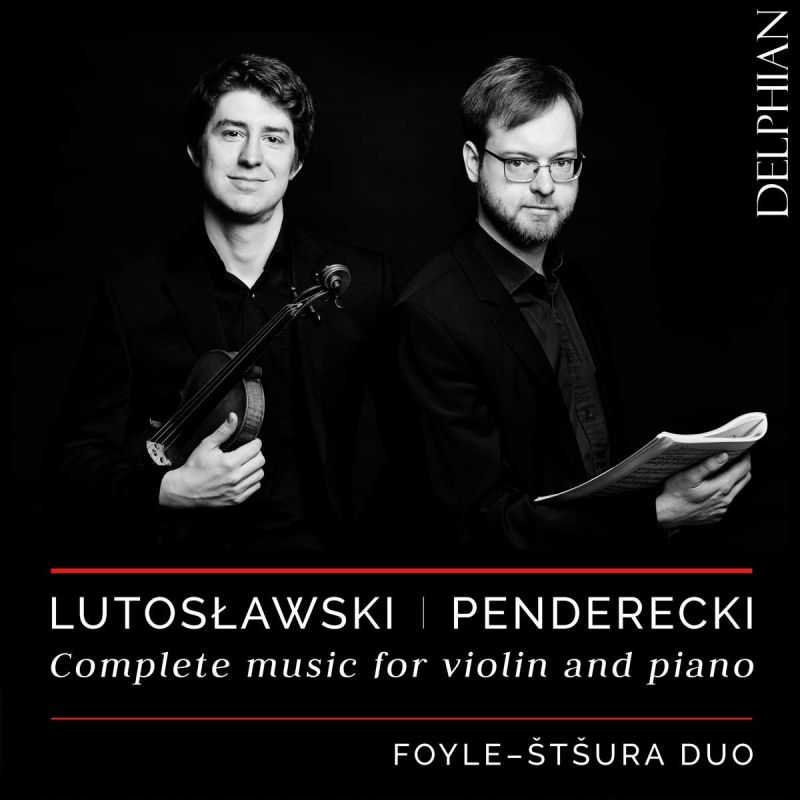LUTOSŁAWSKI; PENDERECKI Complete Music for Violin and Piano
View record and artist detailsRecord and Artist Details
Composer or Director: Krzysztof Penderecki, Witold Lutoslawski
Genre:
Chamber
Label: Delphian
Magazine Review Date: 03/2019
Media Format: CD or Download
Media Runtime: 73
Mastering:
DDD
Catalogue Number: DCD34217

Tracks:
| Composition | Artist Credit |
|---|---|
| Partita |
Witold Lutoslawski, Composer
Maksim Štšura, Piano Michael Foyle, Violin Witold Lutoslawski, Composer |
| Recitativo e Arioso |
Witold Lutoslawski, Composer
Michael Foyle, Violin Witold Lutoslawski, Composer |
| Subito |
Witold Lutoslawski, Composer
Maksim Štšura, Piano Michael Foyle, Violin Witold Lutoslawski, Composer |
| Sonata for Violin and Piano |
Krzysztof Penderecki, Composer
Krzysztof Penderecki, Composer Maksim Štšura, Piano Michael Foyle, Violin |
| Sonata for Violin and Piano No 2 |
Krzysztof Penderecki, Composer
Krzysztof Penderecki, Composer Maksim Štšura, Piano Michael Foyle, Violin |
| (3) Miniatures |
Krzysztof Penderecki, Composer
Krzysztof Penderecki, Composer Maksim Štšura, Piano Michael Foyle, Violin |
Author: Richard Whitehouse
With Lutosławski, the tensile interplay of incisiveness and plangency in Subito (1992) is not a world away from the poised lyricism of Recitativo e arioso (1951), written at the height of Stalinist influence in Poland. It is interesting just how effectively the youthful Penderecki handles this issue in his First Sonata (1953), whose three succinct movements allude to Prokofiev and Bartók without denying a Socialist Realist aesthetic. A changed cultural climate is evident in the Three Miniatures (1959), with its frequently stark pointillism and Webernesque asperity.
The two large-scale pieces typify both composers in their full maturity. The largest chamber work of his later years, Partita (1984) finds Lutosławski taking well-honed procedures to a new peak of refinement – its propulsive outer movements framing brief ad libitum passages that provide for emotional ‘breathing space’ and which, in turn, frame a central Largo whose fervent eloquence is thereby made the more affecting. If Penderecki’s Second Sonata (1999) feels at all diffuse by comparison, it features one of this composer’s most finely realised movements in a central Notturno as haunting as it is evocative. Before it, the speculative Larghetto and capricious Allegretto make for a viable continuity; less so the ensuing Allegro, whose over-inflated and hectoring rhetoric rather undermines the plaintiveness of the brief final Andante.
Such is not the fault of Michael Foyle or Maksim Štšura, who project a determined cohesion, even if Anne-Sophie Mutter is unequalled in the Second Sonata for her imperiousness. Still, with its sound of unsparing immediacy, the many virtues of this disc can hardly be gainsaid.
Discover the world's largest classical music catalogue with Presto Music.

Gramophone Digital Club
- Digital Edition
- Digital Archive
- Reviews Database
- Full website access
From £8.75 / month
Subscribe
Gramophone Full Club
- Print Edition
- Digital Edition
- Digital Archive
- Reviews Database
- Full website access
From £11.00 / month
Subscribe
If you are a library, university or other organisation that would be interested in an institutional subscription to Gramophone please click here for further information.




